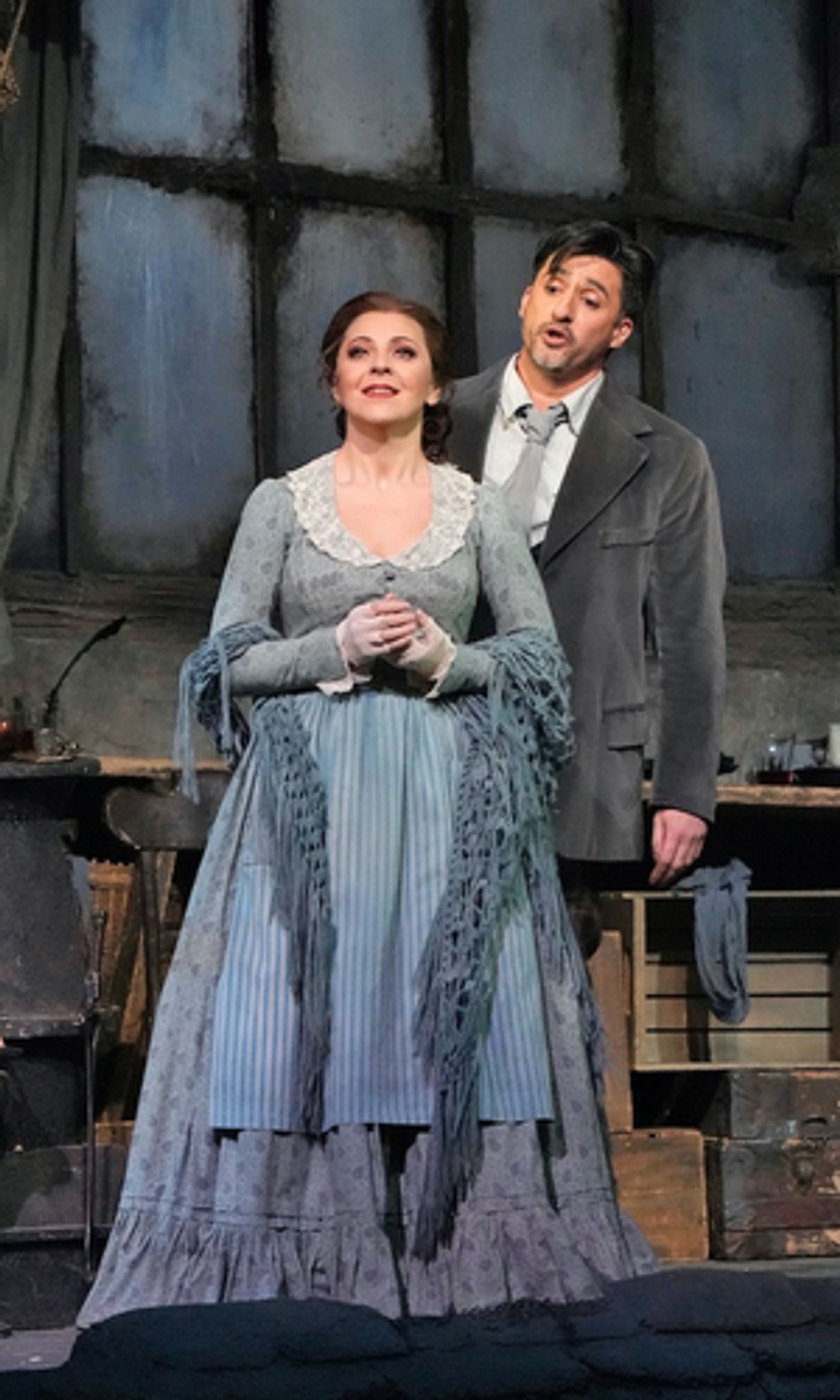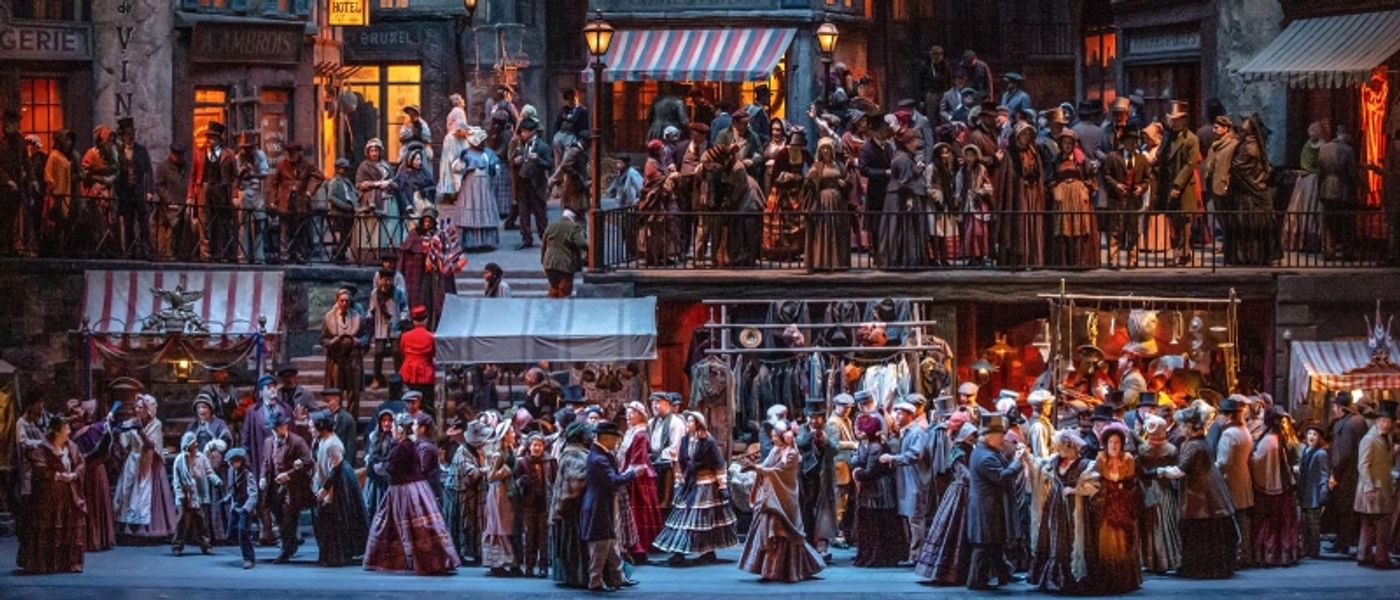
Puccini's "La Boheme," returned for its second run of the season this week and cast and conductor delivered the goods. There's nothing to say that has not already been said about La Boheme as an opera and the famous Zeffirelli production, so we won't dwell on it.
A new conductor and largely new cast (Charles Castronovo was the only hold over from the first cast in December) gave the Metropolitan Opera's 10 millionth performance of La Boheme (Kidding! Just a slight exaggeration) Far too often the Metropolitan Opera employs a fairly loose approach to casting Puccini's "Bohème," knowing that the title and the production will ensure audiences regardless of the cast. But Covid has made even Boheme a crap shoot in terms of drawing audiences.
Maestro Carlo Rizzi, whose Met debut was conducting Boheme back in 1993, did a fine job rallying the troops into a lively and passionate reading of the familiar score. Rizzi's relationship with the Met has been "Boheme-heavy" for decades. In fact, for well over a decade, aside from perhaps one Barbiere and one Rigoletto, it seemed like Boheme was the only opera the Met would hire him for. This is a practice the Met has been guilty of for ages: pigeon-holing artists into a single category and often in a single role or opera. A few seasons ago when the Rizzi returned to the Met after a protracted absence, he showed he was not a one-trick-pony at all, delivering a magnificent Norma. The concept that an artist must first try out and succeed in something abroad in another house before they are considered for the job at the Met is something that makes me wonder - more on this subject later!
A few quirky low notes aside, Maria Agresta, was a superb Mimi, dramatically stirring, both vocally and acting. She gave Met audiences a standout Micaela a few seasons ago and continues to charm. She shaped Mimi's delicate phrases smoothly with some lovely, shimmering high notes. Her "Donde lieta usci" was especially touching and allowed her to show off some nice acting chops.
Charles Castronovo was a zestfully engaging Rodolfo whose clarion high notes rang out gloriously. His performance boasted vibrancy in the joyful moments and delicate lyricism in the mournful moments. One can easily see why the Met (as well as Covent Garden, La Scala, Berlin and Vienna) views him as the ideal Rodolfo. However, the major European houses have all engaged Mr. Castronovo in far more exciting fare as well. He's clearly one of the finest tenors in the world today, so when will we in New York, finally hear this thrilling voice in some juicier roles? (Attention Mr. Gelb... attention Mr. Gelb...)

Gabriella Reyes showed the house why she was chosen by WQXR Classical Radio as one of "20 for 20 Artists to Watch." Her Musetta was bright, adorable, with just the right amount of scenery chewing. She was not the typical one-note Musetta and her beguiling "Quando me'n vo" brought the house down.
Lucas Meachem's Marcello is one of the best in the business. His voice is resounding, huge, but warm. His take on Marcello has grown in depth since we first heard it a few seasons ago and his interplay with Ms. Reyes was deliciously fun and charming. Kudos to both he and Ms. Reyes as they were especially lyrical in the quartet "Addio dolce svegliare alla mattina" which can often devolve into a shouting match.
.jpg?format=auto&width=1400)
Alexander Birch Elliott as Schaunard and Peter Kellner as Colline provided ample support to the four principles. It is worth noting that the horse-play between the roommates can often feel ridiculously forced and phony, but Elliott and Kellner deserve praise for stellar performances, and proving the old adage "there are no small roles." Kellner delivered a particularly tender and elegiac "Vecchia zimarra senti" in Act Four.
Maestro Rizzi, while providing a rich and textured reading, occasionally brought the sound to a level that just about drowned out some of the singers. One interesting observation about the physical aspect of his conducting: in the last couple of seasons (and especially last night) Maestro Rizzi has really become much "busier" physically at the podium than he used to be - enough that it was noticeable from the audience. It is an interesting affectation and one wonders if perhaps it is the fussier movements that encouraged the orchestra to play louder than usual in this well-worn score?
Nonetheless, it was a an extremely satisfying performance all around, and the audience - severely limited by the Met's new stricter vaccine restrictions - gave both cast and conductor nearly a dozen, exuberant, well-deserved curtain calls.
-Peter Danish
Photos: Ken Howard
Reader Reviews
Videos
